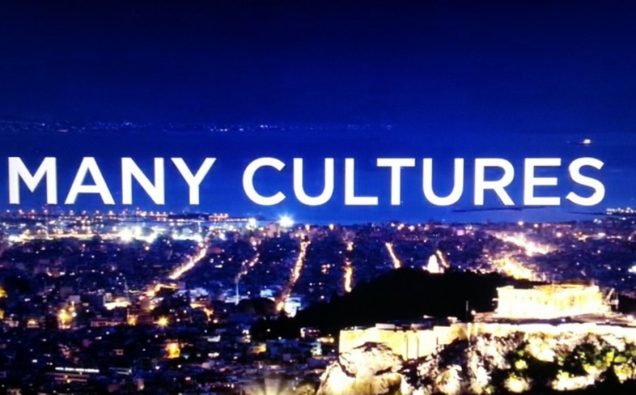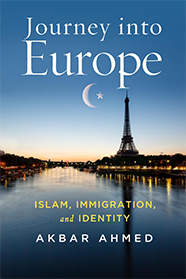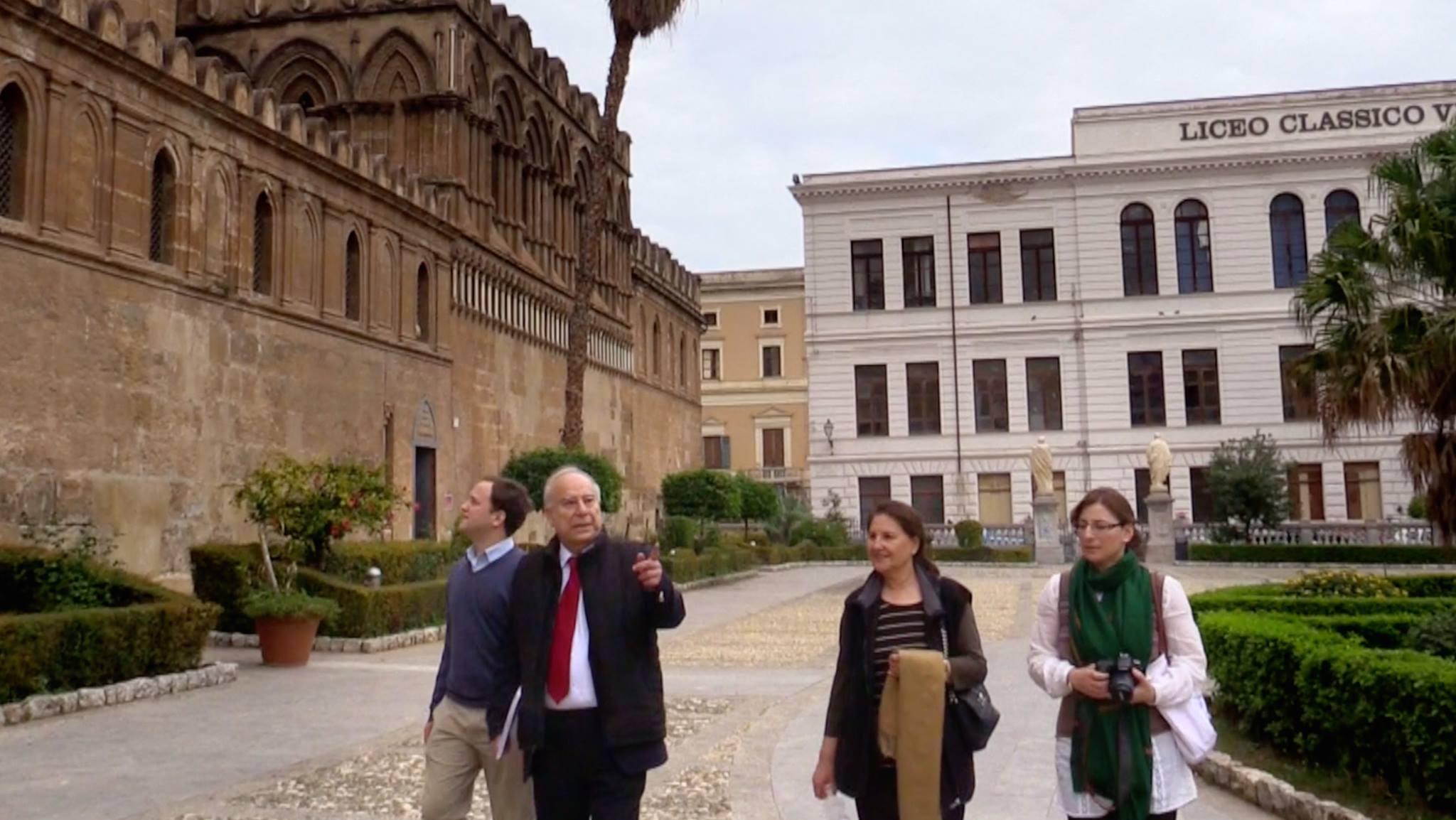
Professor Akbar S. Ahmed’s Journey into Europe is a multi-levelled endeavor. It is a journey into the soul of Europe undergoing its latest upheaval in which the values underpinning pluralistic democracy have been put into question; it is an exploration of the roots of terrorism within a ruptured society; it is a foray into the origins of the respective intellectual paradigms of both sides of the cleavage, paradigms twisted today under the stresses of high unemployment and a refugee population that is not socially integrated.
Akbar brings together these various dimensions of the journey through a living human contact with the Muslim community in Europe. A community that is estranged from its own tribal tradition of social cohesion but is yet to find an identity as citizens within a democratic state. This direct contact gives a sense of immediacy to the historical examination. By weaving into his exploration these individual narratives, a moment of existential choice, Akbar brings a sense of the dramatic to what would otherwise have been a detached analysis.
The empathy with which he understands those suffering and bewildered individuals, informs his articulation of the historical, social and intellectual context of both the plight of the refugees and the inability so far of the European state to address it. In the course of the journey these multiple levels are integrated: the narratives of individuals setting the stage for the social, and the historical. Thus, the architecture of the book signifies Akbar’s own multi-dimensional sensibility: compassionate, artistic and scholarly.
The curtain opens to a scene in a dark and dingy garage in an underground parking lot in Athens. This is a city which represents vividly the encounter between refugees broken away from their tribal background and a polarized European society divorced from its Enlightenment tradition: roving gangs of neo-Nazis terrorize the Muslim immigrants. The Greek state is tottering under the political stresses of high unemployment and a bankrupt government unable to provide citizens with the economic cushion that characterizes a democratic welfare state. I
t is a Greek tragedy reminiscent of Sophocles as Akbar reminds us. The narrative of the migrants makes palpable the poignancy of this historical moment: “the neo-Nazis….(are) threatening to slaughter us like chickens and burn down the mosque if we did not leave the country”, said a young immigrant shivering with anxiety, Akbar reports.
Here in a brutally inhospitable environment is lit the cauldron of anger and desperation in which individuals, without the anchor of their traditional identity, can be driven to violence by charismatic figures propounding a self-serving ideology. This distorted notion is bereft of compassion and reason which are essential to Islam, and inform the quest of Muslims for a humane society of justice and peace. It could be argued that having extruded the kernel of love and knowledge from Islam, it becomes an empty shell of mere form.
It is then wielded to wreak violence and terror against the other. So, what is articulated and practiced in the name of Islam by the militant extremists is actually its very antithesis. Akbar’s camera then pans across the historical sweep in which Muslims came to Europe in different periods. When Muslims first established their rule there in the 8th. century, the great civilization of al-Andalus emerged. At that time, Muslims were ” associated with art, architecture, literature and philosophy”. Learning, creativity and tolerance were the hall marks of that civilization.
In the latest wave, immigrants from North Africa imbued with tribal values have encountered a modern society predicated on the norms of democracy. The former is characterized by the idea of social cohesion through lineage, tribal loyalty and a sense of honor defended by the impulse of revenge. The latter is defined by the principles of equality, reason, individual freedom and law. Akbar argues that this latest contact between Muslim migrants and European society is taking place in an environment of economic deprivation and growing inequality with the state financially unable to fulfil its welfare obligations. There is an associated social intolerance and widespread hostility towards immigrants.
In this context, the modern value system of both the European society and the ancient tribal culture are weakening. The Europeans are tending to move away from the norms of a pluralist democracy and reasserting imagined racial identities. The immigrants, finding their traditional tribal values ineffective modes of survival in a hostile environment, are liable to adopting identities constructed by the narratives of violence. We are then taken on another fascinating journey into the intellectual origins of both tribal culture and the democratic norms of modern European society. This is done by comparing and contrasting the paradigms of Ibn Khaldun and Max Weber respectively.

Photo: JIE Project
Weber studied social and religious behavior in the era of modernity. In Weber’s ” Ideal Type” of a modern society, institutions were built and social and political processes conducted on the basis of rationality. Hence Weber’s concept of citizenship was founded on a democratic polity and the principle of equality. By contrast Ibn Khaldun identifies the organizing principle of tribal society in terms of bloodlines that sustain norms of kinship loyalty, of dignity, of honor and revenge. It is these norms that underlie social cohesion. In Ibn Khaldun’s model of tribal society, the dynamics of stability and change are determined by the degree of social cohesion, he calls “assabiyyah.”
When “assabiyyah” is high, society is strong, when it is low, the tribal grouping is weak. As Akbar walks us through the conceptual edifices of Weber and Ibn Khaldun, he points out that both tribal societies and modern societies in practice diverge from their respective Ideal Types. Khaldun’s ideal tribal society provided rights to the minorities and Weber’s democracies claimed to be subject to the principle of equality. Yet in both kinds of society the interests of the dominant groups prevailed. The institutional structures gave preferential access to the dominant groups or elites over resources, opportunities for advancement and governance.
Here one can ask, what is it in the system of power in the modern democratic state whereby actions are undertaken that violate the very principles on which it is founded? Furthermore, is the divergence between the practice of power and principles underlying the institutional structures, systematic? If regularities in state behavior are observed, then what is the mechanism which determines the actual functioning of the state? These questions could perhaps be the subject of another study that would cast new light on the problem to which Akbar has alluded.
By his nuanced application of Khaldun and Weber to immigrant violence in modern Europe, Akbar provides a brilliant insight into the recent acts of terrorism in Paris and Brussels where Berber groups reside. He argues that in the contemporary period, when tribes migrate for example from the Berber areas of North Africa to start new lives in Europe, they tend to disintegrate as the cohesive force of traditional norms, weakens. In the new environment of the atomized individual, the psyche retains only some randomly fragmented features of the tribal identity, just as only some of the elements of European identity are adopted.
Within the internal psychological space of these contradictions and an external social environment of hostility, some migrants become susceptible to the narrative of the militant extremist groups. Joining such a group provides to the isolated migrant the security of a new identity. Under the extremist ideology, they think, they have an opportunity to vent their anger and take revenge against a society that they feel has violated their dignity.
In the opening scene, Akbar is about to address a prayer congregation of Muslim immigrants in that grimy underground garage in Athens. He feels the desperation of the assemblage that is seething with anger at their miserable plight. Akbar’s sense of compassion drives him to give some message of hope to these tortured souls.
From deep within his consciousness came a balm an inspiration, to tread the path of righteousness despite their suffering: he gave the example of the Prophet of Islam who had faced enormous difficulties with “patience, compassion and courage”. The dingy underground garage which served as their place of their prayer, Akbar told them, was “as beautiful a mosque as any in the world”, because the beauty of a mosque is drawn from the “the power and beauty of the faith in the heart of the worshippers”.
It could be suggested that any journey of knowledge becomes meaningful when it also becomes a journey to the heart, the centre of our being where love prevails. The rediscovery of love, becomes a way of knowing ourselves and the world.
Prof. Ahmed’s multi-levelled journey ends perhaps at such a doorstep, for he gives a call to the European leadership to bring compassion and understanding to bear in dealing with the grave crisis of violent extremism. He asks Europeans to reflect on the actions of “Pope Francis, washing the feet of immigrants” and “Angela Merkel, opening her arms to welcome a million refugees to Germany”.
Akbar Ahmed suggests that these actions evoke the “courage, compassion and humility” of “European humanism”. May it also be suggested, that these are acts of love that come from the human heart, and thus have the potential of uniting all humanity.
The author is Distinguished Professor and Dean School of Humanities and Social Sciences, Information Technology University
















